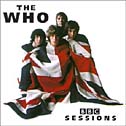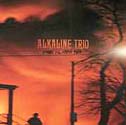








| |



|
|

This week:
Old punks,
new punks,
and timeless zydeco
|
|

Comment
on this story
|
|
The Who
BBC Sessions (MCA)
One would expect the Who—the most manic, unrestrained, and brash band of their g-g-generation—to adapt well to the bare-bones format of the "BBC Sessions" series, and one would be correct. Recorded for British radio between 1965 and 1973, these 25 tracks present the Who developing from nihilistic Mods devoted to American R&B into the architects of an ambitious, expansive sound all their own.
The strain between the regimented soul music the Who adored and the barely controlled fury to which their youth and rage led them is apparent in the first session represented here; "Anyway, Anyhow, Anywhere" dissolves abruptly into squalling feedback and a convulsive rumble of drums. More restrained fare, like blithe covers of "Good Lovin'" and "Dancing in the Street," sit uneasily beside the punked-up speed-freak anthem "My Generation," and it's already no mystery which side of the band's personality will win out.
Subsequent sessions show the Who's rolling thunder being focused and disciplined under the whip of principal songwriter Pete Townshend's growing storytelling ambitions. The turning point is the seven-minute mini-opera "A Quick One (While He's Away)," performed here with remarkable precision. Townshend would soon take the sustained narrative as his milieu.
The album ends in 1973, five years before the death of drummer Keith Moon would end the Who's halcyon days for good. Listening to BBC Sessions, it's tempting to think of Moon as the leader of the band, pushing inexorably forward, daring his mates to match his pace and aggression, redefining the physics of rock drumming as he goes along. On the album's penultimate track, Roger Daltrey yowls one of Townshend's many pronouncements on his chosen art: "Rock is dead, they say," he bellows. "Long live rock!" Those corny sentiments are not just helpful to remember during these boy-band days of 2000, they're words to live and die by. The Who did both.
—Chris Neal
|
|

|
|
Various artists
Music from the Zydeco Kingdom (Rounder)
"What kind of zydeco album is this going to be? A party mix or something more historical?"
That's the question compiler Michael Tisserand faced in putting together an audio accompaniment to his book The Kingdom of Zydeco. The answer he was aiming for was, "Both." And he's done it.
Slap Music from the Zydeco Kingdom in the CD player at your next shindig, and you'd better make sure the rugs are rolled up. Because as the 19 tracks here attest over and over, zydeco is music made for dancing. Your feet won't care much whether they're moving to Amédé Ardoin's 1929 recording of "Two Step de Eunice" or Rosie Ledet's hilariously sexy 1995 come-on, "I'm Gonna Take Care of Your Dog."
But Tisserand has also put together a collection for the dilettante, one that surveys 70 years of Louisiana culture and makes connections between genres and generations. Zydeco evolved as the rural African-American middle ground between the big-city R&B of New Orleans and the accordion-driven two-steps of Acadian country. The word itself says a lot about the desperate energy that drives the music. It's derived from a line in several early songs, "Les haricots sont pas salé" ("The snap beans aren't salty"), a coy way of saying there's no meat to cook with the greens. The slurring of "les haricots" turned into "zarico" and eventually "zydeco." The music is the product of a similar alchemy, working boogie-woogie backbeats into the rigid locomotion of Cajun rhythms.
Tisserand says this isn't supposed to be a zydeco "greatest hits," but most of the big names are represented: Clifton Chenier (and son C.J.), Boozoo Chavis, Queen Ida, Rockin' Dopsie. There are funky bass-driven workouts like Beau Jocque's "Give Him Cornbread" alongside traditional waltzes like "Hack a 'tit Moreau." As either an introduction to zydeco or an affirmation of its staying power, this is a heap of good stuff.
—Jesse Fox Mayshark
|
|

|
|
Alkaline Trio
Maybe I'll Catch Fire (Asian Man Records)
Chicago's Alkaline Trio usually gets lumped in the emo category, a classification that is somewhat misleading. Their new album, Maybe I'll Catch Fire, is chock full of emotion and introspection, but don't expect the teenage pathos and tearjerker tendencies of the usual emo band.
The album really follows in the melancholy punk rock tradition of Jawbreaker and Hüsker Dü. Like them, Alkaline uses shimmering guitar textures and hoarse, jagged vocals to communicate a disillusioned perspective on the travails of life and love. The 11 tracks on the disc cover a wide emotional and dynamic range. Sure, the songs sometimes express vulnerability, but there's plenty of anger and an occasional sentiment that might be less than politically correct as well. After all, this is still rock 'n' roll music produced by males in their early 20s, so what do you expect?
There is plenty of roughshod and vibrant music on Maybe I'll Catch Fire, but the key to the appeal of the album is the true honesty in the lyrics. The cathartic revelations in the songs are sometimes ugly, just like real life. This kind of warts-and-all exposure is what makes the songs of the Alkaline Trio believable, as opposed to the trite self-flagellation that's passed off as true emotion in much of today's punk and indie music. Throw in the loud, raging guitar sound and you've got a real winner.
—John Sewell
|
|
|

March 23, 2000 * Vol. 10, No. 12
© 2000 Metro Pulse
|
|